RFS Briefings - April 27, 2021
Dear Colleagues,
I am pleased to include another issue of RFS Briefings with some timely and encouraging updates on women in science.
A few highlights to focus on here include upcoming events and awards:
-
As part of the Event Steering Committee, we encourage you to register for the 5th Annual Vivian W. Pinn Symposium on May 11–12, 2021. The virtual event, honoring the leadership and legacy of Dr. Vivian Pinn, will illustrate the scientific, societal, and economic opportunities of integrating sex and gender into biomedical research and the power of working together. This year's symposium is titled “Integrating Sex and Gender Into Biomedical Research as a Path for Better Science and Innovation.” Read more.
-
Picture a Scientist chronicles the groundswell of researchers who are writing a new chapter for women scientists. The film is now available to stream on-demand for those in the US. Read more.
-
Nature Research Awards for Inspiring Women in Science are now open for applications. Applications can be made between April 12 and June 20, 2021, and the winners will be announced in October 2021 during a dedicated ceremony. Read more.
-
Nominations are now open for the 2022 Vilcek Award. The Vilcek Foundation will award three Creative Promise Prizes of $50,000 each to young, immigrant biomedical scientists who demonstrate outstanding early achievement. Applications are open through June 11, 2021. Read more
|
|
Read more...
|
RFS Briefings - April 13, 2021
Dear Colleagues,
I am pleased to include another issue of RFS Briefings with some timely and encouraging updates on women in science.
A few highlights to focus on here include submission information for upcoming events, reports, and articles:
- Scribe Therapeutics, a company co-founded by Jennifer Doudna, co-inventor of CRISPR technology and Nobel Laureate, has completed an oversubscribed $100-million Series B financing. Read more.
- Congratulations to Jane Lubchenco for her appointment to the White House Office of Science and Technology Policy, as Deputy Director for Climate and Environment. She is a former NOAA Administrator and Environmental Defense Fund board member, and a past speaker at an RFS Board Meeting. Read more.
- The Vilcek Foundation has launched an online celebration honoring the recipients of the 2021 Vilcek Foundation Prizes. Visit the online celebration for videos, insights, and photos that put the spotlight on the 2021 Prizewinners. The Vilcek's have been long time supporter of the Rosalind Franklin Society. Read more.
- The National Academies’ Action Collaborative on Preventing Sexual Harassment in Higher Education is inviting proposal submissions for presentations, posters, and sessions on promising and innovative practices to address and prevent sexual harassment in higher education. Read more.
- A special edition of the MIT Faculty Newsletter written by Nancy Hopkins, co-founder of the Rosalind Franklin Society, describes the origins of the Boston Biotech Working Group to address the underrepresentation of women faculty as board members and founders of biotech start-ups. Read more.
- Keystone Symposia, one of our Council of Academic Institutions members, is hosting events with leadership of several key female scientists: HIV Vaccines (June 1-4, 2021), HIV Pathogenesis and Cure (June 1-4, 2021), Neurodegenerative Diseases: Genes, Mechanisms and Therapeutics, (June 7-9, 2021), NeuroImmune Interactions in Health and Disease (June 7-9, 2021)
|
|
Read more...
|
RFS Briefings - March 30, 2021
In honor of Women's History Month, T-Mobile for Business reached out to Dr. Shirley Jackson, president of Rensselaer Polytechnic Institute (RPI), to find out how she achieved her innovative academic and scientific accomplishments. She is the first African American woman to receive a doctorate of any kind from the university. In addition to the doctorate, Jackson has received 55 honorary doctoral degrees, numerous awards, and leadership roles across academia, government, and scientific industries.

Jackson spent her early career at Bell Labs where she helped produce discoveries that led to the fax machine, touch tone phones, solar cells, fiber optic cables, caller ID, and call waiting. Credit: Rensselaer Polytechnic Institute.
Congratulations to Katie Pollard, director of the Gladstone Institute of Data Science and Biotechnology, who has recently been elected into the College of Fellows of the American Institute for Medical and Biological Engineering (AIMBE). She is recognized for her pioneering development and application of novel statistical tools for studying genomic data. She and her team share these tools as open-source software that is now used by researchers around the world, enabling advancements in bioengineering and beyond.
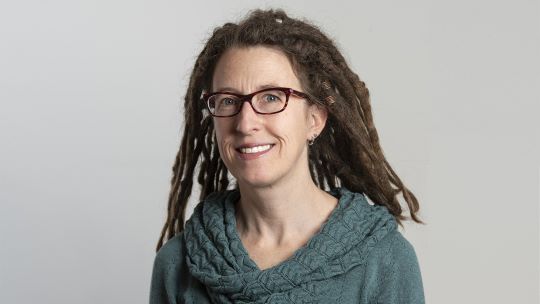
Katie Pollard, PhD, director of the Gladstone Institute of Data Science and Biotechnology
Congratulations to Yunseo Choi, a senior at Phillips Exeter Academy in New Hampshire, who won first place in this year's Regeneron Science Talent Search STEM competition, run by the biotech company Regeneron and the Society for Science. She came up with a matching theory that can be applied to people looking for a life partner. Her algorithms could also be used to match organ donors with recipients, medical students with hospital rotations and cadets to branches of the military.
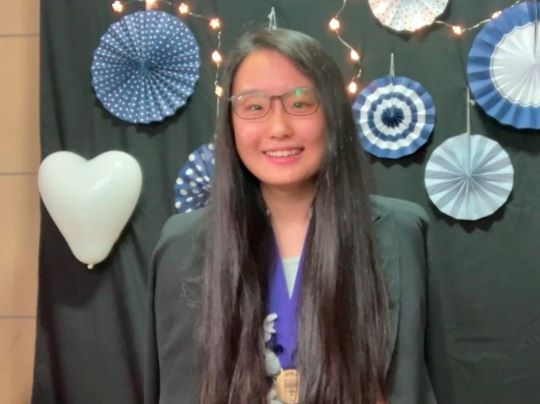 Yunseo Choi won first place in this year's Regeneron Science Talent Search STEM competition. (Society for Science)
Please continue to share important news and opportunities with us so that we may share it with you and others who are committed to supporting the careers of exceptional women in science.
Stay safe and sound,

Karla Shepard Rubinger
Executive Director
Rosalind Franklin Society
www.rosalindfranklinsociety.org
News
Meet the Pfizer scientists who helped develop the COVID-19 vaccine in Rockland. The Pfizer scientists reflected on the past year during a series of interviews at Pfizer's Pearl River site on March 11 — a year to the day that the World Health Organization declared COVID-19 a pandemic.
Erasing women from science? There’s a name for that. Countless women scientists have been shunted to the footnotes, with credit for their work going to male colleagues. This is called the Matilda Effect.
NIH Prize for Enhancing Faculty Gender Diversity: Women continue to be underrepresented at nearly every institution of higher education in the United States in the fields of biomedical, behavioral sciences, and engineering. This is particularly true among mid- to senior-level faculty ranks. The Prize for Enhancing Faculty Gender Diversity seeks to recognize those institutions whose biomedical and behavioral science departments, centers, or divisions have achieved sustained improvement in gender diversity.
Women must not be obscured in science’s history. Nature spoke to several researchers, both women and men, who described the roots of some of the problems, and highlighted a number of efforts towards a more diverse, inclusive and global history of science. The researchers reiterated how much of the literature in science and engineering history is framed around a narrative of the ‘great hero scientist’ — a man who often makes breakthroughs by himself, on the strength of some special insight or individual genius. Where the records show collaborators, these people are also more likely to be men, according to an editorial.
4 women whose work won the Nobel prize for their male colleagues. Who were the women who bestowed a great benefit on humankind yet, perhaps because of unfounded social inequities, never earned a Nobel Prize?
How Mary Wortley Montagu's bold experiment led to smallpox vaccine – 75 years before Jenner. It was a daring and dangerous experiment that paved the way for the development of the first safe vaccine and saved countless lives. Yet when Lady Mary Wortley Montagu deliberately infected her own daughter with a tiny dose of smallpox – successfully inoculating the three-year-old child in 1721 – her ideas were dismissed and she was denounced by 18th-century society as an “ignorant woman”, writes Donna Ferguson for The Guardian.
Researchers co-led by Ana Moreno at the University of California San Diego (UCSD) have developed a non-permanent form of gene therapy for chronic pain that they suggest could offer a safer, non-addictive alternative to opioid drugs.
Jennifer Doudna on the pandemic year: The power of mission-driven science. “The science behind a PCR-based Covid-19 test was right in our comfort zone, but spinning up a clinical laboratory was another matter entirely. Looking back, I’m still in disbelief at how quickly the team was able to safely overcome massive technical, logistical and physical barriers,” writes Jennifer Doudna, a biochemist known for her pioneering work in CRISPR gene editing, for which she was awarded the 2020 Nobel Prize in Chemistry along with Emmanuelle Charpentier.
Carola Eisenberg dies at 103; helped start physicians for human rights. Dr. Eisenberg served as M.I.T.’s dean of student affairs from 1972 to 1978, the first woman to hold that position; she was also the first woman to be named to the university’s Academic Council. From 1978 to 1990 she was dean of student affairs at Harvard Medical School, again the first woman to be named to that office. Throughout her life she encouraged more women to get involved in the medical field. Credit, writes Sam Roberts in an article for The New York Times.
Rosalind Cartwright, psychologist and ‘Queen of Dreams,’ dies at 98. Rosalind D. Cartwright, a renowned sleep researcher, studied the role of dreaming in divorce-induced depression, helped open one of the first sleep disorder clinics, and worked with sleep apnea patients and their frustrated spouses.
‘The Code Breaker’ tells the story of CRISPR pioneer Jennifer Doudna. The biography also delves into the ethics of gene editing. The book digs into the fierce patent battles that have ensued between the University of California (Doudna is at the Berkeley campus) and the Broad Institute of MIT and Harvard, where other researchers, most notably Feng Zhang, were also developing the gene-editing tool. Please visit the RFS website to hear her presentation last fall as the closing speaker for our Women in Science series with GEN. And a terrific interview with author Walter Isaacson appeared recently on GENLive.
ChoKyun Rha, professor post-tenure of biomaterials sciences and engineering, dies at 87. ChoKyun Rha, an MIT professor post-tenure and a groundbreaker in biomaterials science and engineering, died March 2 in Boston. She was 87. She leveraged frontier tools of chemistry and biotechnology for the discovery of novel biomolecules and high-resolution molecular structure, function, and bioactivity determination.
It's not lack of confidence that's holding back women in STEM. In a new study, researchers in Australia found that women students in STEM are equally if not more confident than men in their problem-solving and decision-making, goal-directed behavior, self-esteem, career exploration and career awareness. They were also more likely to have a "plan B" for their careers.
Gianluigi Veglia sexually harassed his students and lab staff but wasn’t fired. “Increasing awareness about sexual harassment in the US has spurred a national dialogue about how to deal with harassers that extends to the chemical sciences. Universities regularly choose between firing professors who sexually harass their students and disciplining them but letting them stay. Veglia’s case is one example of how a judgment to sanction and retain a faculty member, combined with a lack of transparency, can fuel controversy long after the decision was made,” write Andrea Widener and Linda Wang in an article for C&EN.
Women in Innovation and STEM Database at MIT announces fellowship program. WISDM, the Women in Innovation and STEM Database at MIT, celebrated the first anniversary of its digital launch on March 8 — International Women’s Day. To mark the occasion, the tremendous growth of the WISDM community, MIT Innovation Initiative (MITii), which manages the platform/community, announced the WISDM Fellowship Program for scientists interested in improving their public speaking capabilities. We were honored to have WISDM founder, Dr. Ritu Ramen, as an RFS speaker in 2019.
Cambridge astrophysicist overlooked for Nobel prize inspiring new generation of female scientists. In 1967 Dame Jocelyn discovered a new type of star called a pulsar, one of the most significant scientific discoveries of the 20th century, but it was her male PhD supervisor who was awarded the Nobel prize for physics in 1974. “My parents had to fight to allow me into the science class which was for boys only... I reckon that one of the reasons that I made that discovery early on was because I was in a minority and I was working very, very hard to justify my position.... so it was because of my diversity that the discovery got made,” she said. She was a featured speaker at our recent end-of-year conference.
Future of travel may be in the hands of this female teen scientist: Finding inspiration in Elon Musk’s Hyperloop, at the age of 13, Caroline Crouchley created a new concept for a cheaper and more sustainable train and became a finalist at the Discovery Education and 3M Young Scientist Challenge. Now 15, Caroline’s goal is to become an engineer and a scientist one day. Aspiring to study at MIT and Harvard, she wants to be “known for solving large problems facing our world, leaving the planet a better place and improve the lives of all people.”
A new study from the laboratory of Rockefeller’s Leslie Vosshall helps explain why male mosquitoes leave humans alone. It appears that both mosquito sexes share the same neurons and brain structures needed to find humans, but that this hardware is hidden in the male mosquito brain, locked behind a simple genetic switch.
Marianna Limas, Social Media Manager
Nilda Rivera, Partnership and Events Manager
|
HWHM! (Happy Women’s History Month!)
Dear Colleagues,
To help celebrate Women’s History Month, we have a gift for you. In this most unusual and challenging year, with its out-sized impact on women, and with the incredible contributions of female scientists who have pivoted to COVID-19 research, we have created a custom mask to honor them all.
To receive your own, click here, or just email your address to [email protected].
Over the years, Andy Brunning, a chemistry educator based in Cambridge, UK, has made a number of graphics highlighting important women in chemistry history. But highlighting and supporting women in chemistry isn’t just about pointing to historical figureheads. So, this year, he wanted to create something that instead focused on women working in chemistry here and now. Here’s the result: an ongoing series of cards, featuring a wide range of women in chemistry in various roles.
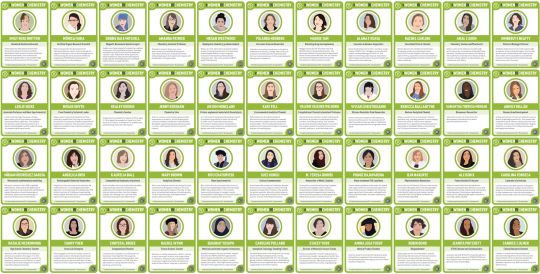
In other news, University of Florida Health biochemistry professor Mavis Agbandje-McKenna, Ph.D., whose world-renowned work on the detailed structure of viruses led to advances in gene therapy treatments for different diseases, has sadly died on March 3 at her home near Gainesville of the neurodegenerative disease amyotrophic lateral sclerosis. She was 57. She was a co-founder of StrideBio, a North-Carolina based startup biotechnology company that focuses on developing AAV vectors that can evade neutralizing antibodies during gene therapy. She will be greatly missed.
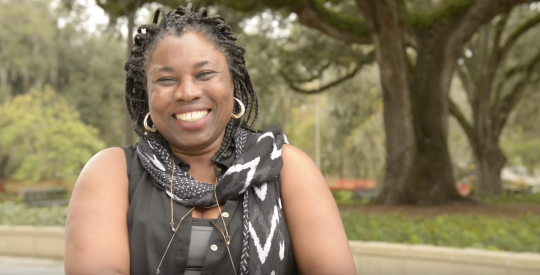
Mavis Agbandje-McKenna, Ph.D.
Please continue to share important news and opportunities with us so that we may share it with you and others who are committed to supporting the careers of exceptional women in science.
Stay safe and sound,

Karla Shepard Rubinger
Executive Director
Rosalind Franklin Society
www.rosalindfranklinsociety.org
News
Raven the Science Maven has a message for aspiring STEM workers: be your unapologetic self. Raven Baxter, also known as “Raven the Science Maven,” is a molecular biologist, science communicator, and RFS Advisory Board member working to shatter barriers and dismantle stereotypes that plague the world of STEM and beyond. “I felt like people were often telling me and signaling to me that they didn’t feel like I belonged in the space largely because of what I look like as a Black woman,” Baxter told Gizmodo. “And so, I really felt like I wanted to try something different in science.”
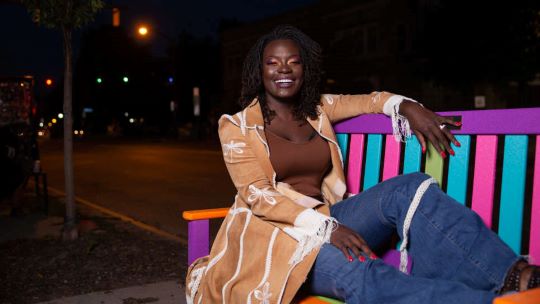
Photo: Courtesy Raven Baxter
An ecosystem of impact: 12 radical women in STEM. From AI to climate, and space exploration to food sustainability, these women are working across the areas that XPRIZE is most passionate about, and that are most important for the future of our planet. One of these radical women is Dr. Jo Handelsman, the first president of RFS. She is the Director of the Wisconsin Institute for Discovery, celebrating it's 10th anniversary at the University of Wisconsin.
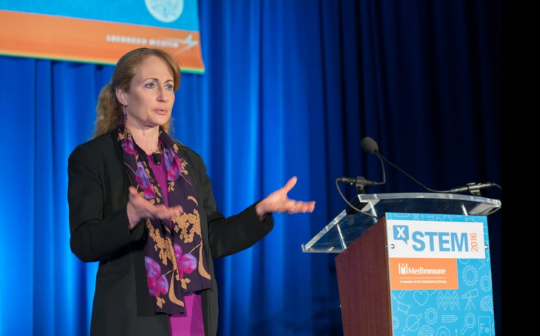
‘On the verge of a breakdown.’ Report highlights women academics’ pandemic challenges. The U.S. National Academies of Sciences, Engineering, and Medicine has released a new report: “Impact of COVID-19 on the Careers of Women in Academic Sciences, Engineering, and Medicine.” In the 253 pages of the report, some of the most resonant pieces are survey responses from women faculty members about the challenges they faced during the first 6 months of the pandemic.
Future Founders Initiative aims to increase female entrepreneurship in biotech: MIT faculty collaborate with members of the Boston-area biotech community to commercialize women’s discoveries and promote female entrepreneurship. Leadership of this initiative includes RFS board member Nancy Hopkins, RFS speaker Susan Hockfield and critical scientist Sangeeta Bhatia. The initiative has ambitious goals, including increasing the fraction of MIT female faculty who found companies from less than 10 percent to 25 percent by 2024.
These 8 women in STEM are at the forefront of the world’s response to COVID-19: Beyond making up 70% of the world's health workers, women researchers have been at the cutting edge of coronavirus research. Here are just some of the women in STEM around the globe who have been making a difference during the pandemic: Dr. Özlem Türeci, Dr Soumya Swaminathan, Ramida Juengpaisal, Professor Sarah Gilbert, Somaya Faruqi, Neema Kaseje, Professor Devi Sridhar, and Dr. Anggia Prasetyoputri.
Women in Innovation and STEM Database at MIT announces fellowship program. The WISDM Fellowship Program promotes the visibility of women in the MIT academic community and increases gender diversity in innovation and entrepreneurship. In partnership with MITii, WISDM founder Ritu Raman, past winner of the Rosalind Franklin Award from BIO and speaker at a past RFS annual meeting. She is an MIT postdoc and AAAS IF/THEN Ambassador, was awarded a $10,000 AAAS IF/THEN Ambassadors Grant for public engagement with science activities that teach, inspire, and promote the next generation of women in STEM.
International Women's Day: Illustrating the Covid-19 pandemic. Meet three women who are using their artistic talents, combined with their expertise in the fields of science, health and technology to help the fight against coronavirus.
NASA names D.C. headquarters after Mary Jackson, its first Black female engineer and STEM leader. “A woman who dismantled barriers and pursued her goals in a field dominated by men then and now, Jackson has demonstrated strength, skill and unrelenting passion for her field. She served as inspiration for Hidden Figures: The American Dream and the Untold Story of the Black Women Who Helped Win The Space Race, a 2016 book that was adapted into a film, and she was posthumously awarded a Congressional Gold Medal in 2019,” writes Monica Haider, contributor at Forbes.
Dolly Parton, who helped fund the Moderna vaccine, gets a ‘dose of her own medicine.’ Last year, Ms. Parton donated $1 million to Vanderbilt University Medical Center, which worked with Moderna to develop one of the first coronavirus vaccines to be authorized in the United States. On Tuesday, Ms. Parton, 75, received a Moderna shot at Vanderbilt Health in Tennessee. “Dolly gets a dose of her own medicine,” she wrote on Twitter.
Mothers in academia address workplace inequalities: Researchers have recently authored a manifesto for supporting mothers in academia. They spelled out a roadmap for policies that would support women and particularly mothers and parents of color, to help level a playing field traditionally dominated by white men.
Sloan Kettering Institute researchers named 2021 Kravis Women in Science Endeavor Fellowship grant recipients. Memorial Sloan Kettering Cancer Center (MSK) announced that Sloan Kettering Institute (SKI) researchers Regina Bou Puerto and Mijin Kim, PhD, have been named 2021 Marie-Josée Kravis Women in Science Endeavor (Kravis WiSE) fellowship grant recipients. “We are thrilled to have two scientific trailblazers as this year’s Kravis WiSE fellowship grant recipients. When we look at the progress made in scientific disciplines, we have long benefited from the significant contributions that have been made by women,” said Ushma Neill, PhD, Vice President of Scientific Education and Training.
Why is it important to encourage more women to pursue science and engineering careers? To stay competitive globally, the United States needs the talent and creative ability of all of its people—both women and men. But women currently are a smaller part of the science and engineering workforce—in industry and in our nation’s colleges and universities.
International Women’s Day: Heidi Larson and the fight against vaccine hesitancy. Vaccines Work hosted a series of interviews with inspirational women from across the world. Here Professor Heidi Larson, Founding Director of the Vaccine Confidence Project, explains how gender can affect vaccine hesitancy.
The women who made modern vaccines work: Have you heard of Edward Jenner, the inventor of the modern vaccine? Or Jonas Salk, whose polio vaccine was a turning point in the fight against this debilitating disease? If you know something about global health, you’ve probably heard of these vaccine pioneers. But what about the women who also helped lay the foundations for modern immunization? Meet five remarkable women who pushed forward the frontiers of science in this article from GAVI.
7 inspiring young women who advance food & ag science. Meet some of the inspiring young women who are working in STEM fields in the food and agriculture industries. Women are the primary faces behind our food production, but still too often, they are facing inherent gender bias.
These Black women are on the frontlines of the fight against Covid-19. They have administered Covid-19 vaccines on college campuses, provided testing at churches and spent long hours in labs developing an effective vaccine. Some have given up their regular jobs and personal free time to do this work. Black women have been at the helm of the nation's fight against the pandemic since the coronavirus hit US soil a little over one year ago, writes Nicquel Terry Ellis for CNN.
A new searchable directory focuses on women innovators in agrifoodtech. This list is the result of a collaboration between women leaders in agtech including Connie Bowen (AgLaunch Initiative), Amy Wu (From Farms to Incubators), Allison Kopf (Artemis Ag), Pam Marrone (Marrone Bio Innovations), and Louisa Burwood-Taylor (AgFunder, AFN, MWOMA).
Meet the heroes you never knew you had: Three underappreciated female pioneers of synthetic biology. In honor of International Women’s Day, here are three overlooked scientists whose research provided key insights into the quirks of genetics, the uses of proteins, and the value of computation in molecular biology. Their work was controversial and undervalued when it was first published, but now it’s clear that these women blazed trails for modern synthetic biology, writes Theresa Machemer for SynBioBeta.
Women chemists committee: A megaphone for women chemists. How can all women develop a confident and forceful voice to advocate for equal social and professional positions in this world? As individuals, how can we help achieve equity and equality in what we say and do? As the newly appointed chair of the American Chemical Society Women Chemists Committee (WCC), Amy M. Balija wants to focus on empowering women. The committee’s mission is to attract, retain, develop, promote, and advocate for women to positively impact diversity, equity, and inclusion in the American Chemical Society as well as in the profession.
Events
When You Picture a Scientist, Who Do You See? A panel conversation on advancing diversity and inclusion in STEM. During this live event scheduled for Wednesday, March 24 at 3:00pm, Nobel Prize-winning Dr. Jennifer Doudna (featured in the film Human Nature) and other world-renowned scientists welcome your questions following a candid conversation on advancing diversity and inclusion in STEM. The discussion is inspired by the award-winning documentary Picture a Scientist, which features one of the RFS founders, Nancy Hopkins.
Addressing Diversity, Equity, Inclusion, and Anti-Racism In 21st Century STEMM Organizations: A Summit. The National Academies of Sciences, Engineering, and Medicine (NASEM) will convene a national summit that will highlight how racism operates at different levels in science, technology, engineering, math, and medicine (STEMM) settings. They invite you to submit nominations for committee members and/or reviewers for this study by March 18, 2021. The national summit will be held in mid to late June.
We See You: The Power of Female STEM Role Models On and Off the Screen, (March 17, 2021) This wide-ranging discussion will touch upon how writers for television and film develop characters that challenge stereotypes, the research on the powerful impact of role models in inspiring our next generation of scientists, and the very personal stories of struggle and triumph from a trail-blazing doctor who is a role model to so many.
Opportunities
The Vilcek Foundation is now accepting applications for the 2022 Vilcek Prizes for Creative Promise in Biomedical Science and Dance. Three prizes of $50,000 will be awarded in each of two categories: biomedical science and dance.
Gladstone Institutes launches new program aimed to increase the representation of historically underrepresented groups at the postdoc level. Like all Gladstone postdocs, participants in this program will receive personalized career mentorship, build their writing and communication skills, and have opportunities to develop their mentorship skills through programs like Gladstone’s summer internship program, PUMAS. In addition, members of the program will receive tailored coaching to ensure their long-term success as well as a $10,000 stipend.
Marianna Limas, Social Media Manager
Nilda Rivera, Partnership and Events Manager
|
|
|